Continuation from "Convert generic List/Enumerable to DataTable?"
I've been using the following code to covert a generic List<T> into a DataTable:
public static DataTable ToDataTable<T>(this IList<T> data)
{
PropertyDescriptorCollection properties =
TypeDescriptor.GetProperties(typeof(T));
DataTable table = new DataTable();
foreach (PropertyDescriptor prop in properties)
table.Columns.Add(prop.Name, Nullable.GetUnderlyingType(prop.PropertyType) ?? prop.PropertyType);
foreach (T item in data)
{
DataRow row = table.NewRow();
foreach (PropertyDescriptor prop in properties)
row[prop.Name] = prop.GetValue(item) ?? DBNull.Value;
table.Rows.Add(row);
}
return table;
}
However, I now have a list List<foo> where foo contains a property List<bar> (where List<bar> can contain zero values).
Question:
I want to convert a generic List<foo> containing another generic nested List<bar> such as :
List<bar> GenericNestedList = new List<bar>{ new bar("barA"), new bar("barB") };
List<foo> GenericList = new List<foo> { new foo("fooA", GenericNestedList) };
To result in a DataTable:
| GenericProperty | GenericNestedProperty |
|-----------------|-----------------------|
| fooA | barA |
| fooA | barB |
The original code accounts for many properties within foo, bar would also have this requirement.
So far I've been able to retrieve the properties of bar, however I've been unable to figure out how to populate the Datatable when List<bar> is empty. I don't have a lot of experience writing generic methods, so my apologies for not being able to provide a lot of my workings.
Other Examples:
List
List<foo> GenericList = new List<foo> { new foo("fooB", new List<bar>()) };
Datatable
| GenericProperty | GenericNestedProperty |
|-----------------|-----------------------|
| fooB | |
List
List<bar> GenericNestedListA = new List<bar>{ new bar("barC"), new bar("barD") };
List<bar> GenericNestedListB = new List<bar> { new bar("barE"), new bar("barF") };
List<foo> GenericList = new List<foo> { new foo("fooC", GenericNestedListA),
new foo("fooD", GenericNestedListB) };
Datatable
| GenericProperty | GenericNestedProperty |
|-----------------|-----------------------|
| fooC | barC |
| fooC | barD |
| fooD | barE |
| fooD | barF |
Classes:
foo
class foo
{
public string GenericProperty;
public List<bar> GenericNestedList;
public foo(string GenericProperty, List<bar> GenericNestedList)
{
this.GenericProperty = GenericProperty;
this.GenericNestedList = GenericNestedList;
}
}
bar
class bar
{
public string GenericNestedProperty;
public bar(string GenericNestedProperty)
{
this.GenericNestedProperty = GenericNestedProperty;
}
}
